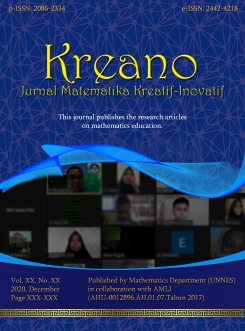Focus and Scope
Kreano is a place to share and communicate research results from researchers or invited authors. Kreano publishes original, novel, and empirical works in the field of mathematics education. Researchers can come from Lecturers, Teachers, Researchers, and students who need broad access to the publication of your research results.
The Journal invites original research articles and not simultaneously submitted to another journal or conference.
Jurnal Kreano invites authors to conduct empirical research according to the classification in the Mathematics Education Database. The criteria for articles that are included in the scope of the journal are as follows:
- Psychology of mathematics education, research in mathematics education, which includes:
- Affective behavior and mathematics education
- Cognitive processes, learning theories (aspects of mathematics education)
- Teaching-learning processes in mathematics education
- Mathematics education and society, including ethnomathematics. The Ethnomathematics carried out are those generated through empirical studies. The ethnomathematics has been applied to students, and the results of the study can be seen. Research related to ethnomathematics cannot be said to be complete if it has not been applied in learning.
- Education and instruction in mathematics, which includes:
- Comprehensive works and comparative studies on education and instruction in mathematics.
- Mathematics teaching methods and classroom techniques
- Teaching mathematical problem solving and heuristic strategies
- Student assessment, achievement control and rating (aspects of mathematics education) - Learning difficulties and student errors (aspects of mathematics education)
- Mathematics teaching units and draft lessons
- Education of foundations of mathematics, including Reasoning and proving in the mathematics classroom.
- Educational materials and media and educational technology in mathematics education, which include:
- Comprehensive works on educational materials and media and educational technology in mathematics education
- Textbooks, textbook research (aspects of mathematics education)
- Teachers' manuals and planning aids (aspects of mathematics education)
- Problem books, competitions, examinations (aspects of mathematics education)
- Computer-assisted instruction, e-learning (aspects of mathematics education)
- Manipulative materials (aspects of mathematics education)
- Technological tools, calculators (aspects of mathematics education)
- Audiovisual media (aspects of mathematics education)
- Learning on mathematics topics, which include: Geometry education; Algebra education; Analysis education; Education of combinatorics, graph theory, probability theory, and statistics; Education of mathematical modeling and applications of mathematics; Education of numerical mathematics; and Computer science (educational aspects).
Furthermore, the Journal Kreano does not limit the methods used in research including:
- Didactical Design Research (DDR).
DDR is research that produces learning design. The resulting learning design starts from didactic situation analysis, observations on learning, interviews with students, teachers, and other necessary parties, as well as analyzing teacher and student books. DDR can also be implemented in universities. The DDR referred to in the study refers to the Didactical Situation Theory by Brousseau, Harel, and Suryadi. - Qualitative Research
The editor realizes that the development of research in mathematics education is getting closer to a qualitative approach. This research can reveal phenomena about student learning outcomes, suitability of models, media and environment, to student character. This research may include an analysis of student errors or a description of students' abilities and skills in mathematics, the observations of which are carried out during learning. Researchers who apply a qualitative approach must explain the stages of research, and reveal the phenomena encountered during the research. Qualitative research is also constantly evolving, therefore, we recommend reading the trends of contemporary qualitative research methods. - Classroom Action Research
The resulting classroom action research must be clear about the problem. The gap between ideal conditions and facts found in the classroom is revealed in depth based on a comprehensive learning theory. The CAR stages are clearly described, what are the objectives in each cycle, accompanied by indicators of the success of the action. The discussion in the CAR article must be able to relate the research findings, the success of the action, and the learning theory used. - Research and Development
In development research, strong reasons are needed in this research. The author must describe the reasons for the development carried out. The reasons can be in the form of facts found in the field or basic ideas that are equipped with a comprehensive theory. Research Development can be in the form of developing learning models, facilitation models, learning media or learning evaluations. We suggest to refer Plomp Model, ADDIE or another RnD research. - Quantitative research
Quantitative research in educational research has discussed its strengths and weaknesses philosophically. Quantitative research, within the scope of Kreano, is quantitative research that analyzes to the inferential stage. Statistics used up to further test. The discussion of research results must arrive at the implications of the research findings.


